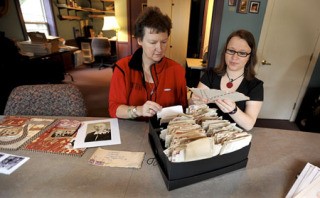As is often the case when an enterprise is conceived, happenstance led to the inception of Preserving Heritage, an unusual business started late last year by Anna DuPen and daughter Margalyn Hemphill.
They were perusing the belongings of patriarch James Thomas after his December 2005 death when they discovered more than 300 letters he had written to his girlfriend and eventual wife, Anna. The posts were sent during the three years the North Carolina native served in the U.S. Army in World War II.
“Essentially,” DuPen said as she told her father’s story at her Bainbridge Island home, “they were love letters…very personal. He wrote to my mother every day; these were just part of them.”
While reading the letters they realized the story they captured…his feelings during a critical time his life, including the devastation of “washing out” of pilot school and the year he spent as a radio operator on the Kwajalein Atoll in the Marshall Islands. Nothing spectacular, perhaps, but the letters revealed his inner thoughts and had corporeal significance to two people who loved him.
It took six months, but they painstakingly typed and then digitalized each letter. “It was the ‘overwhelming stage’ of what was to become a book project,” said DuPen. They eventually understood that the letters represented an intimate narrative that should be preserved for the entire family. Since Thomas was a “pack rat,” DuPen said, collecting corroborating photos and documents was not a problem.
After spending $6,000 and hundreds of hours to create a dozen books for family members, it became clear to DuPen and Hemphill that they could have done all of the “prep work” they paid the publisher to do except for the actual printing of the hard-cover volumes.
“We realized we could do it on our own,” said Hemphill, a 2005 history graduate from Western Washington University. They researched the specific knowledge they would need to produce family history books and quickly set out to acquire such skills. Hemphill enrolled in a six-month publishing arts program at Seattle Central Community College; DuPen, a career nurse, is a quarter short of finishing a genealogy certification program at the University of Washington.
As Hemphill honed her new graphic design skills and DuPen dived deep into historic research, the startup became official in October. They have purposely started slowly with the creation of three single-subject history books, but their products show promise. Take the story of Abner Graves.
An island woman and her family contacted Preserving Heritage because she wanted to know more about her grandfather, who was a 19th century mining engineer and businessman of some renown. The family provided photographs and newspaper articles about Graves. One of the more interesting tidbits was Graves’ involvement in an investigation which led to the determination that Abner Doubleday had invented baseball in Cooperstown, N.Y., where Graves was born and lived as a boy.
But when Hemphill contacted the Baseball Hall of Fame and Museum in Cooperstown she discovered that Graves had not been forthright about the facts he presented in a 1905 letter. The letter was an influential piece of evidence considered by the Mills Commission, which later issued a report that in fact dubbed Doubleday as the game’s inventor. Many years later, however, the claims were proven false.
And the “dirty little secrets” of Graves’ life didn’t stop there. Hemphill also discovered that Graves, an invalid at the age of 90 in 1924, had fatally shot his second wife during an argument in their Denver home. A jury found him “mentally unbalanced” and he was committed to a state mental institution; he died two years later.
When Hemphill and DuPen presented their findings, Graves’ granddaughter initially balked at including the negative facts in the book. But family members ultimately decided to include the information.
“During our research period we’ll go as far as we can,” DuPen said. “When we’re done researching, we present it to the client and show them how we would like to put it together. But it’s the family’s story. There may be conflict on some issues, but we’ll do whatever they want because they’re paying for the book.”
Their service varies from simply proofreading pre-written text to basic genealogy/family tree projects to a four-generation family history book. They’ll also provide just primary assistance if the clients want to do most of the work themselves.
Despite today’s economic climate, they believe their patience and the uniqueness of the endeavor will payoff in the long run. Fortunately, their overhead is low since they’re working in a shop on DuPen’s property.
They’re confident the business will succeed because genealogy is one of the fastest-growing hobbies in the world. Many small and large organizations have started to proliferate in the U.S. because of that interest.
“We’re trying to get the word out the best we can,” said DuPen. “We feel it’s better to have sort of a grass-roots start where we let people know about us through the website (www.preservingheritage.com) and flyers. It’ll take time, but we’re still learning about our capabilities so that’s OK. And we like working at home.”
The long-range business plan includes displaying their work at some of the large genealogy conferences held throughout the country. Eventually they’d like to be working simultaneously on as many as five projects.
Meanwhile, they’re doing another project for a previous client. And in her spare time, Hemphill, who is five months pregnant, is doing a labor of love. Appropriately, it’s a four-generation history of her father’s family.



